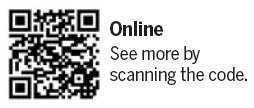

When an ex-Madison Avenue television producer moved to Beijing with her family, she found the city lacked bread that they like. She tells Deng Zhangyu how she ended up making artisan loaves with a taste of New York.
Her daughter is Jennifer Yeh's inspiration and motivation, and that is why she named her artisan bakery after the little girl - Boulangerie Nanda.
"Nanda", Yeh explains, is Sanskrit meaning "daughter".
|
At her artisan bakery in Beijing, Jennifer Yeh bakes with skills she picked up as a hobby back in the United States. Photos provided to China Daily |
|
Jennifer Yeh with her daughter Nanda. |
That explains the inspiration, but what about motivation?
While it is easier these days to find baguettes, sandwich loaves and croissants in the chain-store bakeries that dot Beijing neighborhoods, Yeh missed the quality of breads in New York, where she lived for many years. Good artisan breads were best for her family, she was sure.
Her solution was to bake them herself, with skills she had picked up as a hobby back in the United States as a vent for stress at work.
There are 10 basic types of breads at Boulangerie Nanda, because Yeh insists on only making what she likes, and what she does best.
"You can call me paranoid. I only do what I want to do and what I can do," says Yeh at her bakery just next to an expatriate community in Beijing's Shunyi district.
She learned to make bread during her 15 years studying, living and working in New York where she worked as a TV commercial producer for a decade.
While she never attended a professional cooking school to train in baking, her neighborhood bakeries in New York taught her everything about bread.
"I don't like cooking, but I like baking," she says. She would ask her friends and neighbors when their birthdays were, or if they were going to have Christmas gatherings because she loved baking cakes and breads for them.
It was still very much a hobby, until she came to China.
Yeh and her Canadian musician husband arrived in Beijing with their 2-and-a-half-year-old daughter in 2006. Her husband complained that the only breads they could find were topped with garlic, chopped green onion and meat floss, and soon stopped eating bread altogether.
Yeh was caught in a quandary because her daughter Nanda loves bread. A series of food scandals and genuine concern about the safety of ingredients also worried Yeh as a mother.
Two years after they moved to China, Yeh decided to start Boulangerie Nanda.
Now, Yeh regards her bakery as another baby to nurture, instead of just a commercial venture. It is not about making money, she says, but about introducing quality artisanal breads to those who appreciate them.
That is the reason why she imposes very strict requirements on her bakers and her quality control is famous among her staff.
She had tested all kinds of flours on the market and finally found the right type from a small mill run by the farmers themselves. She next kept her assistant bakers working until they got the taste right, without any compromises.
Bakery assistant Zhang Ai-ping says Yeh is very exact.
"The baking time must be just right. And the weight of the sliced breads must be the same or more. Otherwise we have to start all over again," says Zhang.
At Yeh's shop, "artisan" means local, fresh, seasonal and natural. The shelf life of her breads is no more than a day and she refuses to do fancy desserts or cakes that require the use of refined sugar or artificial colorings such as green tea cakes or jellies and mousses.
Bread in Boulangerie Nanda may not look perfect and the variety is limited, but it has not affected popularity among the expat communities and Chinese consumers who patronize the weekend Beijing Farmers' Markets where Boulangerie Nanda has a regular spot.
"I won't call my bread organic. I call it natural. My daughter eats the same thing as you do," says Yeh, confidently.
"People come, smell and taste. They know it's good bread and they will return to buy again."
Yeh is now experimenting with gluten-free breads for her customers who cannot eat wheat. To make sure there is no cross-contamination, Yeh has created a separate working area on the second floor of her bakery.

At the Beijing Farmers' Markets, Yeh's stall is always crowded and her breads disappear very quickly. But, she says, Boulangerie Nanda is still far from turning a profit because of the cost of ingredients, and the cost of handcrafting the bread.
Yeh says the most important thing is that she is doing what she feels is right, even though she has already invested her daughter's college fund into the bakery.
"My husband and I are not a typical couple. Big houses and fancy cars are not part of our dream," she says. In the meantime, thanks to Nanda, Beijingers get to enjoy good bread, baked with conscience, love and integrity.
Contact the writer at dengzhangyu@chinadaily.com.cn.